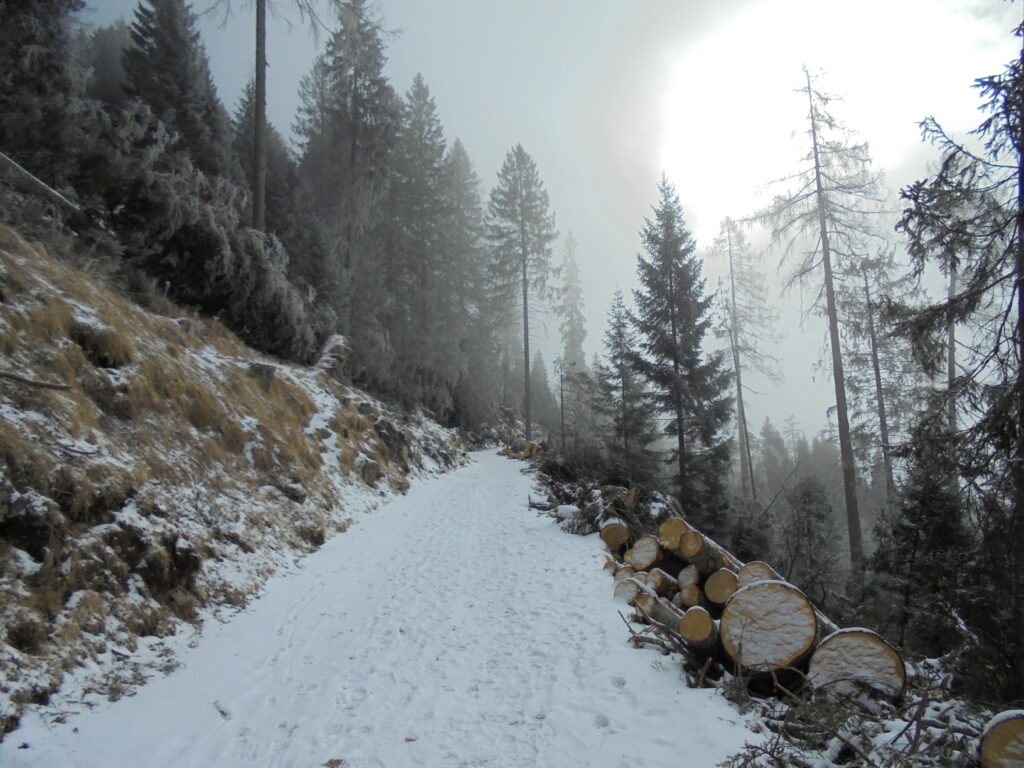Una delle differenze sintattiche più studiate tra l’italiano standard e i dialetti riguarda l’espressione del soggetto impersonale (o soggetto espletivo) con i verbi metereologici. In questa sezione analizzeremo la sintassi del soggetto impersonale nei dialetti parlati nella regione Veneto e nella provincia autonoma di Trento, basandoci sull’articolo di Tomaselli & Bidese (2023). Prendendo come esempio la frase ha/è nevicato, vedremo come nei dialetti parlati in Trentino (come anche in alcune varietà venete) sia necessario aggiungere il pronome clitico di terza persona singolare maschile el o l’ per formare una frase grammaticale. Quindi, al posto di ‘ha/è nevicato‘, in molti dialetti è possibile trovare forme come ‘L’a nevegà’. Questo uso è confermato da alcuni file audio raccolti nell’ambito dei progetti AlpiLinK e VinKo: ascolta la frase in (1) per due esempi nella provincia di Trento.
(1) L‘a fiocà (ha/è nevicato) /a le aute l‘a flocà e a le basse l‘a plovu (in alto in montagna ha/è nevicato, e in basso a valle ha/è piovuto)
L’uso dell’espletivo con i verbi meteorologici è comunque molto più comune nei dialetti trentini rispetto ai dialetti veneti. Nei primi, infatti, l’85,7% dei parlanti produce il soggetto impersonale, mentre questa forma è stata attestata solo nelle province di Verona e Vicenza (rispettivamente 29,9% e 20%), e non in quelle di Padova o Venezia (Tomaselli & Bidese 2023: 12). Ciononostante, grazie ai dati di AlpiLinK, è stato possibile attestare la presenza di queste forme anche in altre province del Veneto, come per esempio nella provincia di Treviso (2.3, Cavaso del Tomba).
(2) L’a nevegà (ha/è nevicato) / in alto in montagna l‘a nevicà e in basso l‘a piovuo / su in montagna l’a nevegà e giu in fondo l‘a piovest (in alto in montagna ha/è nevicato, e in basso a valle ha/è piovuto)
É stato proposto che il contatto con il tedesco e una somiglianza superficiale del modello possano aver giocato un ruolo nella conservazione degli espletivi nei dialetti trentini (Tomaselli & Bidese 2023: 16). L’uso di questo cosiddetto espletivo con i verbi meteorologici è comune in lingue come l’inglese (it has snowed), il tedesco standard (es hat geschneit) e anche nelle varietà germaniche storiche parlate nella provincia di Trento e nel Veneto. L’espletivo z si trova infatti anche nelle varietà cimbre parlate a Luserna (TN) e Letjzan/Giazza (VR), come illustrate nell’esempio (3).
(3) z hatt gesnibet (ha/è nevicato) / au hoach affn perge hatz gesnibet un ledrå hatz gerenk / au tze perge hatz gasnaibat un nidar hatz garegat (in alto in montagna ha/è nevicato, e in basso a valle ha/è piovuto)
Riferimenti
- Rabanus, Stefan, Anne Kruijt, Marta Tagliani, Alessandra Tomaselli, Andrea Padovan, Birgit Alber, Patrizia Cordin, Roberto Zamparelli & Barbara Maria Vogt (2022): VinKo (Varieties in Contact) Corpus v1.1. Bolzano-Bozen: ERCC.
- Rabanus, Stefan, Anne Kruijt, Birgit Alber, Ermenegildo Bidese, Livio Gaeta & Gianmario Raimondi. 2024. AlpiLinK Corpus 1.1.2. In collaborazione con Paolo Benedetto Mas, Sabrina Bertollo, Angelica Bonelli, Jan Casalicchio, Raffaele Cioffi, Patrizia Cordin, Silvia Dal Negro, Alexander Glück, Joachim Kokkelmans, Adriano Murelli, Andrea Padovan, Aline Pons, Matteo Rivoira, Marta Tagliani, Caterina Saracco, Alessandra Tomaselli, Ruth Videsott, Alessandro Vietti & Barbara Vogt. DOI:10.5281/zenodo.11352290.
- Tomaselli, Alessandra & Ermenegildo Bidese (2023): Fortune and decay of lexical expletives in Germanic and Romance along the Adige River. Languages 8(1), 44.
Nota: grazie a R. Ferracin per le trascrizioni in cimbro negli esempi (3.2) e (3.3).

